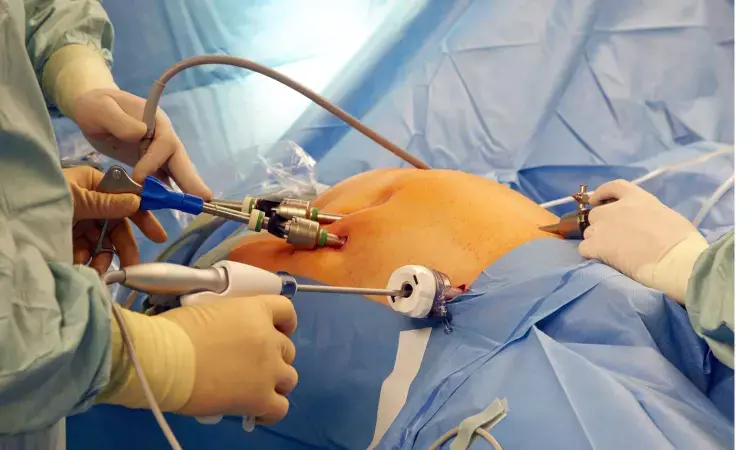- Home
- Medical news & Guidelines
- Anesthesiology
- Cardiology and CTVS
- Critical Care
- Dentistry
- Dermatology
- Diabetes and Endocrinology
- ENT
- Gastroenterology
- Medicine
- Nephrology
- Neurology
- Obstretics-Gynaecology
- Oncology
- Ophthalmology
- Orthopaedics
- Pediatrics-Neonatology
- Psychiatry
- Pulmonology
- Radiology
- Surgery
- Urology
- Laboratory Medicine
- Diet
- Nursing
- Paramedical
- Physiotherapy
- Health news
- Fact Check
- Bone Health Fact Check
- Brain Health Fact Check
- Cancer Related Fact Check
- Child Care Fact Check
- Dental and oral health fact check
- Diabetes and metabolic health fact check
- Diet and Nutrition Fact Check
- Eye and ENT Care Fact Check
- Fitness fact check
- Gut health fact check
- Heart health fact check
- Kidney health fact check
- Medical education fact check
- Men's health fact check
- Respiratory fact check
- Skin and hair care fact check
- Vaccine and Immunization fact check
- Women's health fact check
- AYUSH
- State News
- Andaman and Nicobar Islands
- Andhra Pradesh
- Arunachal Pradesh
- Assam
- Bihar
- Chandigarh
- Chattisgarh
- Dadra and Nagar Haveli
- Daman and Diu
- Delhi
- Goa
- Gujarat
- Haryana
- Himachal Pradesh
- Jammu & Kashmir
- Jharkhand
- Karnataka
- Kerala
- Ladakh
- Lakshadweep
- Madhya Pradesh
- Maharashtra
- Manipur
- Meghalaya
- Mizoram
- Nagaland
- Odisha
- Puducherry
- Punjab
- Rajasthan
- Sikkim
- Tamil Nadu
- Telangana
- Tripura
- Uttar Pradesh
- Uttrakhand
- West Bengal
- Medical Education
- Industry
Head-to-head study shows bariatric surgery superior to GLP-1 drugs for weight loss

Sleeve gastrectomy and gastric bypass were associated with about five-times more weight loss than weekly injections of GLP-1 receptor agonists semaglutide or tirzepatide,* at the end of two years, according to a new head-to-head real-world study presented today at the American Society for Metabolic and Bariatric Surgery (ASMBS) 2025 Annual Scientific Meeting.
Researchers from NYU Langone Health and NYC Health + Hospitals discovered patients who had one of the bariatric procedures lost an average 58 pounds after two years compared to 12 pounds for patients who received a GLP-1 prescription for at least six months (24% total weight loss vs. 4.7%). Patients on continuous GLP-1 therapy for a full year lost more weight, but significantly less than bariatric surgery patients (7% total weight loss).
“Clinical trials show weight loss between 15% to 21% for GLP-1s, but this study suggests that weight loss in the real world is considerably lower even for patients who have active prescriptions for an entire year. We know as many as 70% of patients may discontinue treatment within one year,” said lead study author Avery Brown, MD, a surgical resident at NYU Langone Health. “GLP-1 patients may need to adjust their expectations, adhere more closely to treatment or opt for metabolic and bariatric surgery to achieve desired results.”
The study was a retrospective comparative effectiveness study using the real-world electronic medical record data of NYU Langone Health and NYC Health + Hospitals patients with a body mass index (BMI) of at least 35 who had bariatric surgery (sleeve gastrectomy or Roux en-Y gastric bypass) or were prescribed injectable semaglutide or tirzepatide between 2018 and 2024. After adjusting for age, BMI and co-morbidities using average treatment effect weighting, researchers compared the outcomes of 51,085 GLP-1 and surgical patients. The study was supported by NYU CTSA grant KL2 TR001446 from the National Center for Advancing Translational Sciences at the National Institutes of Health (NIH).
“In future studies we will aim to identify what healthcare providers can do to optimize GLP-1 outcomes, identify which patients are better treated with bariatric surgery versus GLP-1s, and determine the role out-of-pocket costs play in treatment success,” said study senior author and bariatric surgeon Karan R. Chhabra, MD, MSc, Assistant Professor of Surgery and Population Health, NYU Grossman School of Medicine.
About 12% of Americans say they have ever taken a GLP-1 drug, including 6% who say they are currently in treatment. A recent study found that more than half of patients with overweight or obesity (53.6%) discontinued GLP-1 therapy within one year (53.6%), a number that grows to 72.2% by two years. Meanwhile, utilization of metabolic and bariatric surgery remains exceedingly low. According to the ASMBS, more than 270,000 metabolic and bariatric procedures were performed in 2023, which represents only about 1% of those who meet eligibility requirements based on BMI.
“While both patient groups lose weight, metabolic and bariatric surgery is much more effective and durable,” said ASMBS President Ann M. Rogers, MD, FACS, FASMBS, who was not involved in the study. “Those who get insufficient weight loss with GLP-1s or have challenges complying with treatment due to side effects or costs, should consider bariatric surgery as an option or even in combination.”
According to the U.S. Centers for Disease Control and Prevention (CDC), the prevalence of obesity and severe obesity is 40.3% and 9.4%, respectively. Studies show the disease can weaken or impair the body’s immune system and cause chronic inflammation and increase the risk of scores of other diseases and conditions including cardiovascular disease, stroke, type 2 diabetes, and certain cancers.
Dr Kamal Kant Kohli-MBBS, DTCD- a chest specialist with more than 30 years of practice and a flair for writing clinical articles, Dr Kamal Kant Kohli joined Medical Dialogues as a Chief Editor of Medical News. Besides writing articles, as an editor, he proofreads and verifies all the medical content published on Medical Dialogues including those coming from journals, studies,medical conferences,guidelines etc. Email: drkohli@medicaldialogues.in. Contact no. 011-43720751


